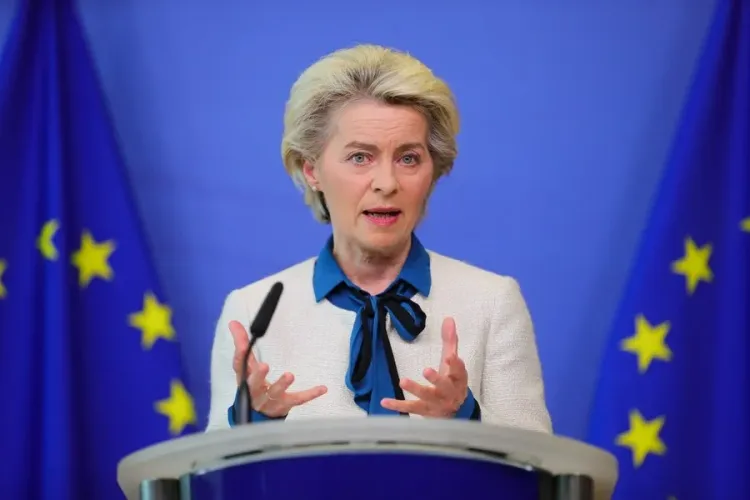How Did EU Chief Ursula von der Leyen Survive the No-Confidence Votes?

Synopsis
Key Takeaways
- Ursula von der Leyen survived two no-confidence motions with centrist support.
- Criticism of the EU-US trade deal remains a significant issue.
- Concerns about the EU-Mercosur deal highlight tensions among European farmers.
- Political polarization is increasing within the European Parliament.
- Von der Leyen must address transparency issues to maintain confidence.
Brussels, Oct 9 (NationPress) The President of the European Commission, Ursula von der Leyen, successfully navigated two no-confidence motions on Thursday, thanks to the support from centrist parties. These motions, initiated by far-right and far-left factions in the European Parliament, were debated on Monday before the voting took place on Thursday.
Von der Leyen expressed her gratitude to the lawmakers for their backing, affirming that the European Commission will continue collaborating with the European Parliament to address the challenges confronting Europe. The motion proposed by the Patriots for Europe (PfE) saw 378 votes against it, with 179 in favor and 37 abstentions. The motion from The Left was met with 383 votes against, 133 in favor, and 78 abstentions, as reported by Euro News.
In a statement on social media platform X, von der Leyen remarked, "I sincerely value the robust support I received today. The Commission will persist in its close partnership with the European Parliament to confront Europe’s challenges and deliver results for all citizens. United for our people, our values, and our future."
The support for von der Leyen was slightly greater than during her first no-confidence vote in July. Although she was not present in Strasbourg on Thursday, her ability to withstand both censure motions highlights the increasing tensions among pro-European factions that have criticized the trivialization of the right to propose no-confidence motions, according to Euro News.
Both motions shared a common thread of criticism regarding the EU-US trade agreement and its unfavorable conditions for European exporters. This agreement entails a non-binding commitment to allocate €750 billion for US-made energy and to invest €600 billion in the US market, facing severe backlash across the political spectrum.
A recent poll revealed that 52% of respondents deemed the deal a "humiliation" for Europe. Von der Leyen acknowledged the deal's imperfections but asserted that it remains "solid" enough to manage the commercial disruptions initiated by former US President Donald Trump.
The PfE and The Left, who proposed the motions against von der Leyen, raised concerns regarding the detrimental effects of the EU-Mercosur free trade agreement on European farmers. This deal, finalized by von der Leyen last December, is now awaiting legal text adoption. They also criticized her for a lack of transparency.
However, these two parties hold differing views on various issues. The Patriots are worried about the EU Commission's handling of irregular migration and its "misguided" green policies, while The Left condemned its inability to address the climate and social crises, as well as the ongoing offensive by Israel in Gaza.
In July, von der Leyen faced a similar challenge, with 360 votes against her dismissal, 175 in favor, and 18 abstentions. However, these consecutive motions reflect the political polarization she encounters during her second term. During the July debate, she labeled her critics as "Russian puppets" but extended an olive branch to reset her relationship with the parliament and reconcile differences within her centrist coalition.









